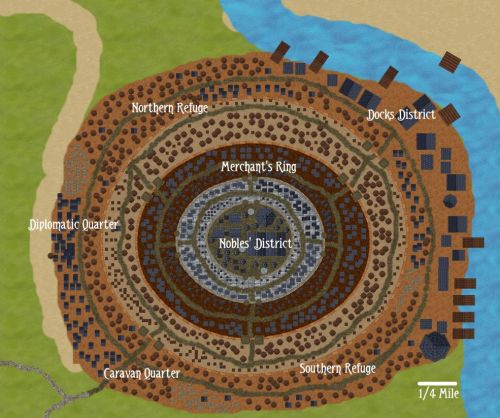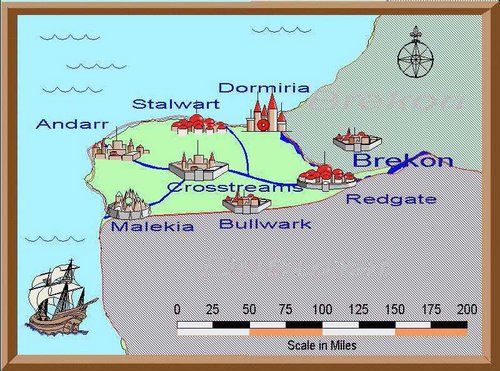Dormiria
| Dormiria | |
| Other Names: | City of Refuge |
| Society: | |
| Nation/Territorial Area: | The Seven Cities |
| Population: | 527,000 |
| Languages: | Common, Romini, Elven |
| Deities Worshipped: | Dra'Nar, Hurine, Dagath, The Harpinger, Valok |
| General Alignment: | Lawful Neutral (Evil) |
| Head of City Government: | Governor Lydia Fenshaw |
| Races: | |
| 40% Orc, 20% Human, 10% Dwarf, 10% Elf, 10% Shaardan, 10% Other | |


Dormiria, also known as The City of Refuge, is located on the northeast corner of the land that contains The Seven Cities right on the border with the orcish nation of Brekon.
History
Early Settlement
The region now known as the Seven Cities remained sparsely populated well into the Age of Immortals. Small fishing settlements emerged along the Blood Coast after the orcs had settled in Western Negaria after the Great War, but the Divalok River Delta was left untouched. The Golden Scythe offered a more comfortable climate for orcs with rich farmland, unhindered by the memories of the imminent destruction of their race.
Settlement around the Divalok Delta began in earnest in the late third century O.D., as the rise of the Bandit King The'ton and his kingdom of Dubunat began to eat into the Kurathene’s land trade to the southern nations. The increased importance of sea lanes combined with the short range of ships of the period, there was a need for a safe harbor between the Kurathene ports of Kalion and Brescant and the southern nations. The Blood Coast given its natural depth and easy access to the freshwater from the Divalok River was viewed as an ideal location for a harbor. Temporary trading settlements appeared along the coast, but there was no concerted effort to expand these into permanent ports.
This changed in 317 O.D., when Joral Kuras gave out six Crown Charters to the six wealthiest noble families to establish a city on the Divalok Delta. These six Charter Cities were Andarr, Dormiria, Red Gate, Stalwart, Bullwark and Conselia.
The charter for Dormiria was given to the Dorminster nobles that hailed originally from Pylatea. With fertile soil, the land was easily arable, and a spot along the Ledextran River gave them easy access to inland trade, but the port out into the ocean was not as deep as those enjoyed by the other cities of the time. For this reason, Dormiria remained one of the smaller sites of the chartered cities.
Since its inception, Dormiria enjoyed frequent trade and relations with the orcish nation of Brekon situated immediately across the Ledextran River. Though the Imperial government politics of The Kurathene Empire never allowed construction of a bridge across the waterway for fear of invasion, a vibrant ferry industry started in its place. Also somewhat to the dismay of the imperial elite, the trade included population.
By 425 O.D. the practice of magery in Brekon was outlawed for hundreds of years, and secret practitioners of the craft were ruthlessly hunted by the Dominators of Valok. The reach of these holy warriors ended at the river, however, a fact quickly grasped by fleeing orcish mages and their families. The government of Brekon was loathe to risk a conflict with The Kurathene Empire by crossing the river into its territory.
In addition to fleeing orcish mages, escaped slaves from Brekon commonly crossed over the river. In Dormiria, slavery was illegal during this early period which made it a quick and convenient place to flee the clutches of slave markets in Brekon. Slaves of all races that wound up in the orcish markets of Brekon who were lucky enough to be rescued found their way eventually into Dormiria. Some stayed and some kept moving from there.
Over the course of a millennium, with several other wars on the [[Negaria]n continent producing refugee crises of their own, the population of Dormiria shifted from being human dominant to other. This impacted the culture and social structure which changed to reflect the new mix of races, and slowly drew the area away from The Kurathene Empire.
Independence
The gradual drift away from The Kurathene Empire came to a head in the 1300's A.O.D. As the original human population of Dormiria was now a minority within the realm, and many of the recent immigrants began to question the need to pay taxes and tithes to the Imperial Crown.
Dormiria and the other Charter Cities had established a Provincial Council in the 12th century, and had begun to take many of the functions of government from the traditional estates. With the outbreak of war with Dubunat in 1320, the Council elected to form the Charter Militia Legion, an army independent of the Imperial Army detachments. Over the next two decades, the Council expanded its privileges as the Imperial government became increasingly bogged down in the war in Dubunat.
When the war with Dubunat ended in 1360 with the The Kurathene Empire’s defeat, the Provincial Council led by Governor Sir Michael Hawke of Crosstreams took the first steps toward independence. In 1362 he and the Council signed an oath affirming their commitment to the independence of the Charter Cities. Later in the same year, the individual estates of each city ratified the call for independence.
On New Year’s Day in 1363 the Provincial Council of the Charter Cities, with Governor Hawke in the lead presented their declaration of secession to the Imperial Army garrison commander, Legate Warren Hale. Rather than risk bloodshed, Hale accepted the declaration and departed with his garrison for Brescant. When word of the declaration reached the ears of Joral Kuras, he paused, nodded his head and was the first leader to acknowledge the independence of the city-states which included Dormiria.
With independence, the Provincial Council quickly found itself superseded by local interests. The city of Conselia was the first to secede from the alliance as it renamed itself Malekia. It was quickly followed by Dormiria, Red Gate and Stalwart, who sought to avoid paying the costs associated with maintaining the army. With the obligations to the central council removed, the cities quickly started to squabble with one another, leading to an escalating round of trade barriers and skirmishes over territory lines.
The nations of Dubunat and Brekon found the squabbling city-states in the Divalok Delta to be an attractive prize. Over the next century and a half, both nations sent expeditions to annex one or more of the cities, which were driven off repeatedly by a coalition of militias from the Seven Cities. On several occasions during this period, the army of Brekon crossed the Ledextran River and sacked the streets of Dormiria, destroying most of the architecture from before this period.
After a particularly large invasion attempt in 1518 by Dubunat, the Lord Governor Curtis Allendale of Andarr proposed that the seven city-states form a confederation as a common bulwark against their enemies, and to mediate disputes between the cities. Six months of tense negotiations later the final Confederate Charter was ratified by all seven cities.
With their security assured by their shared commitment to defense, The Seven Cities steadily gained influence and wealth. The death of Joral Kuras in 1815 and the subsequent collapse of the Second Imperium helped fuel this growth. By the end of the Age of Strife in the 22nd century, The Seven Cities Confederation had become the center of civilization and culture on Negaria, the envy of all civilized nations.
The prosperity of The Seven Cities led to the flowering of egalitarian values. Though the wealthy mercantile families had steadily entrenched themselves as new nobility, there was a gradual move toward creating greater political opportunities for the common class. The governors of Crosstreams and Dormiria became positions chosen by popular vote, while the Confederate Estates-General was diversified with the addition of a third estate made of tax-paying citizens, with the franchise opened to all citizens of the Confederation.
The Seven Cities Confederation
Unfortunately, unity among the chartered cities did not last. Their squabbling degenerated into skirmishes and the council broke up into completely independent city-states, each responsible for its own defense and well-being. The nation of Dubunat to the south took advantage of this disunity in 1518 and invaded Bullwark and the rest of the cities, nearly conquering the entire realm, but were beaten back once the cities realized they must unite and work together. Later that year, Lord Governor Curtis Allendale of Andarr proposed a confederation of the seven cities for mutual defense and trade. Within six months the treaty was ratified and the The Seven Cities Confederation was born.
The presence of the confederation was a stabilizing force in the region that nearly halted war between Dubunat and the remnants of the Empire to the north. Trade flourished as well as the population and its diversity.
Recent History
Dormiria is a popular place for those who are fleeing the laws of other nations or groups because it has a very lenient government that does not look kindly upon intrusions by outside forces to affect their own justices. For orcish refugees it is especially popular because it is easy to get to, yet not as frequented by orcish officials as the city of Red Gate, which is much closer to the orcish capitol city of Brekon.
This makes the city a breeding ground for all those who are disaffected with deities like Valok and The'ton, and those who wish to engage in activities not looked kindly upon by the orcish nations. Many of the rising numbers of orcish mages can be found here because of that, and some of these folk are managing to gain a foothold in the Dormirian government as well.
Naturally, this neutrality and seeming propensity to harbor outlaws puts Dormiria at odds with its orcish neighbor, and quite a few skirmishes have broken out in Brekon's attempts to force its way in after one of its interests. Because of the position it enjoys as part of the confederacy of The Seven Cities, Dormiria is unafraid of Brekon and uses these benefits to its solid advantage.
The term "refugee" does not describe objectively whether a creature is unseedy or benign whatsoever. Thus, personalities and races of all kinds can be found in Dormiria. Unfortunately, many of them are paranoid in nature, but they currently have confidence in the government to protect them from outside nabbers.
On the other hand, this paranoia is also counterproductive to Dormirian culture and economics. The city port is used more often to smuggle persons out of the area than it is used to bring in goods for sale or trade. A large personal protection trade has risen up because of this, and many of the best bodyguards and caravan protectors can be found here, which makes them Dormiria's largest export.
Districts
Some of the refugees have managed to piece together a small merchant economy inside the city, and a market district of sorts has sprung up in the city within the last few decades. One can also find some fairly nice houses in the center district which house the nobles of the city and its government buildings. There is also a highly developed town watch police force based in the east of the city that works to keep meddlers from other governments out of the city, and it is rumored that some of these are actually "secret" guards that go in plain clothes and get involved in underworld dealings in order to pre-empt outside interference.
Government
Religion
Organizations
Notable Officials & Personalities
Landmarks
In-game Developments
There is no online version of these lands in play currently, and knowledge of this information in game is limited to characters that have reason, ability, and circumstance to know. Seek DM permission if there is any doubt.
Technical Aspects
N/A - These lands exist only in the pen and paper version of Avlis, not on any of the current servers.